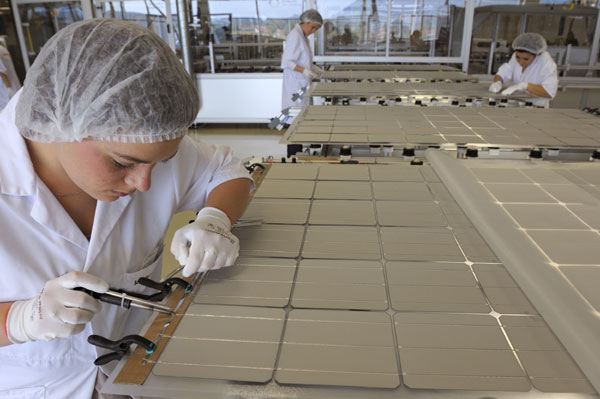
China said on Monday that it has made a complaint to the World Trade Organization against photovoltaic subsidies in the European Union, the latest move in the row between the two economies over solar products.
The case was launched when the Ministry of Commerce requested consultation with the EU and its member states concerning photovoltaic subsidies granted by Italy and Greece.
The two countries issued decrees in 2011 and 2012 that offered additional subsidies of 10 percent on electricity generated by photovoltaic installations if the main components of the installations were produced within the EU or the European Economic Area — comprising of the EU, plus Iceland, Norway and Liechtenstein.
The ministry said the subsidies violated WTO rules in two ways. First, they violate the "national treatment" principle, which mandates indiscriminative treatment toward imported goods. Second, they constitute prohibited subsides under WTO agreements regarding the use of domestic over imported goods.
"They have a significant effect on exports of Chinese photovoltaic products and prejudice the rights of China as a member of WTO," said ministry spokesman Shen Danyang.
Many countries subsidize solar-generated electricity to encourage their solar operators and related equipment manufacturers, but fall short of giving additional subsidies to installations that primarily use domestically manufactured components, said ministry official Yang Guohua.
 |
|
Workers assemble solar panels in a factory in Sainte-Marguerite, France. China has filed a complaint to the World Trade Organization about the subsidies offered to solar panel makers by some European Union countries. [Photo/Agencies] |
Italy is the third-largest importer of China's solar products within the EU.
China's exports of solar products to Italy fell from $4.8 billion in 2010 to $3.9 billion in 2011. They further dipped to $760 million in the first three quarters of this year, according to the ministry. Greece was the eighth-largest importer within the EU in 2011, importing $337 million worth of China's solar products.
A directive issued by the EU in 2009 on the promotion of energy from renewable sources laid the foundation for the two countries' laws, and the EU is also responsible for its member states' trade policies, which explained why China has also taken action against the EU, Yang said.
Around 57 percent of China's solar exports, worth $20 billion, went to the EU in 2011, according to Chinese industry figures, and the country imported $7.5 billion worth of solar equipment and raw materials from the EU.
According to WTO rules, the EU should decide whether to accept China's request for consultation within 10 days. The consultation should settle the dispute in less than two months and if it fails, the case would be submitted to a panel of experts, which should make a judgment in six to nine months, said ministry official Chen Yusong.
The case follows the EU's decision in September to launch an investigation into whether Chinese companies were "dumping" solar panels in Europe.
The row escalated when China announced on Nov 1 it would begin an anti-dumping and anti-subsidy investigation into its imports from the EU of solar-grade polysilicon, an important material in solar cells.
But Chinese officials said Monday's complaint is an isolated case, citing that the ministry's research was conducted much earlier than the EU's anti-dumping probe.
Ministry officials are also optimistic about the case. China had previously filed 10 similar cases since the nation joined the WTO in 2001, and won six of them.
However, industry experts said the lawsuit is not expected to aid China's ailing photovoltaic industry, which is plagued by excess capacity
"It won't help China's solar industry by starting a trade war," said Li Junfeng, head of the China Renewable Energy Industry Association.
He said the policy to connect domestic distributed solar power generators to the national power grid would give a major boost to domestic demand and buoy the PV industry, which currently relies heavily on overseas demand.
Starting from Nov 1, State Grid Corp of China, the country's largest State-owned utility company, allowed small-scale distributed solar power generators to connect to its power lines.
Contact the writers at zhengyangpeng@chinadaily.com.cn and dujuan@chinadaily.com.cn







